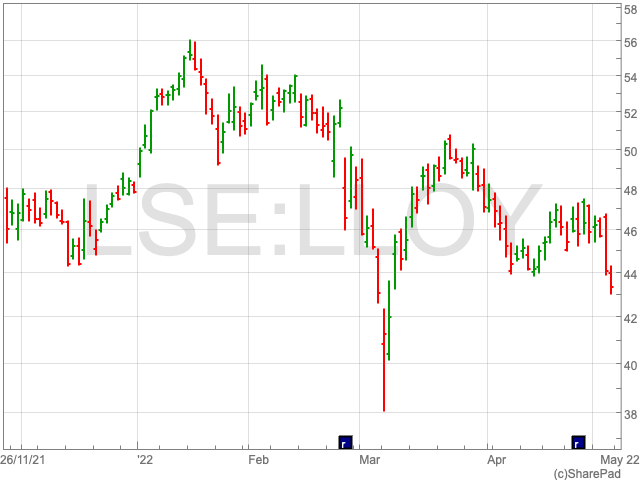The Bank of England (BoE) raised its interest rates to 1% on Thursday. What does the future hold for Lloyds share price as interest rates increase?
Lloyds is the largest mortgage lender in the United Kingdom and Lloyds share price has been erratic since the Bank of England decided to raise interest rates to combat inflation. However, investor may be concerned that future rate hikes may exacerbate the present cost-of-living problem and reduce the number of mortgages taken out, hurting Lloyds’ bottom line.
Mortgages
Lloyds has benefited from a rising property market as the UK’s largest mortgage lender, while higher interest rates mean bigger margins.
The Lloyds share price is significantly dependent on how well the housing market performs, with mortgages accounting for 71% of total loans.
With the Bank of England set to keep raising rates after raising them to 1% this week, there is a lot of concern about the property market’s future.
While higher interest rates usually mean more money in the bank, more expensive mortgages should keep the property market cool. Recent housing data, fortunately for Lloyds, has shown great strength.
Earlier on Friday, Halifax confirmed that the average housing price is £286,079 with a 1.1% rise in April, slower than the 1.4% growth in March. Despite this, mortgage lending and approvals are still on the rise.
Russell Galley, Managing Director of Halifax, said, “Housing transactions and mortgage approvals remain above pre-pandemic levels, and the continued growth in new buyer inquiries suggests activity will remain heightened in the short-term.”
Given the way investors are continually looking ahead, there’s a risk that this bubble may explode shortly.
Loans
Higher interest rates are beneficial to banks because they allow them to earn more money from the money they lend out.
However, there is always the possibility that if interest rates rise too high, banks may suffer a net negative effect due to consumers borrowing less or defaulting on loans which would lead to pressure on Lloyds’ bottom line.
Lloyds has set aside £178m to cover any customer defaults, according to its most recent Q1 results and since Q4 2021, the share of stage 2 and 3 loans has grown. These are debts whose credit quality has deteriorated dramatically and which may not be repaid.
Lloyd Performance
In late April, the banking conglomerate released its first-quarter report, which exceeded expectations.
The company posted pre-tax profits of £1.6bn, exceeding analyst expectations of £1.4bn, however, recorded a decline from £1.9bn in 2021.
Lloyds associated the drop to a £177m charge that it said would safeguard it from inflation-related defaults.
The full-year results from 2021 were also quite promising despite a pre-tax profit which fell just short of experts’ expectations at £6.9bn.
However, FY21 results reported a 9% rise in net income to £15.8bn and a 4% increase in underlying net interest income to £11.1bn.
Outlook
Nonetheless, Lloyds is cautious yet hopeful about the British economy, expressing optimism in its first-quarter results.
Its interim management statement forecasts a 30% gain if the BOE interest rates remain below 1.39% and inflation remains at 7.6%. However, the central bank itself anticipates inflation to peak at 10% later this year.
Lloyds Shares Valuation
The banking group’s shares have a 4.5% dividend yield which is appealing, but that doesn’t change the fact that Lloyds has a track record of underperformance.
Lloyds has a P/E ratio of just 5.7 and a forward P/E of 6.9. That’s a pretty low valuation, especially for a company with significant long-term growth potential.
Unfortunately, Lloyds is still being dogged by a risk premium caused by the financial crisis as investors chose to value banks on their book values rather than the prospects of future earnings.
Nonetheless, brokers have set price goals that are significantly higher than the current 43p share price, and Morgan Stanley recently maintained its 62p price objective.
The targets set by brokers confirm optimism around Lloyds share price, and the move by the BOE could see upside revisions as analyst price in the benefits of higher net interest margins.



Lloyds shares were trading down 1% to 43.5p on Friday afternoon trading, however, YTD the share price has dropped 12.7%.





